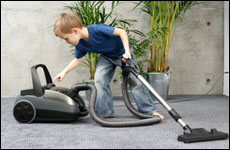 Raise a Glass to Freedom
Raise a Glass to Freedom


5 min read
And it’s your responsibility to do it.
One of the biggest complaints parents have about their kids is: “They’re so irresponsible!”
Usually followed by:
“He never comes home on time!”
“Her room is a mess!”
“His teacher complained that he does not do his homework!”
A child’s irresponsible behavior can be frustrating for parents. It helps to know that kids are not naturally responsible, but they can be taught. That’s where we come in.
Here are five simple ways to teach our kids to be responsible.
Kids watch our every move. They rarely do as we say; they do what we do. It’s always helpful to check ourselves first and see if we are modeling responsible behavior.
Do we shirk our duties at home? Are the dishes left in the sink? Are our telephone messages unreturned, are we often late for meetings? If so, it might be time to take a good look in the mirror and decide how we can act more responsibly.
It is always helpful and comforting to kids to see their parents trying to refine their own behavior. Kids then learn to be responsible for their own actions. They have a living model for how to improve their behavior when they hear:
“I need to be more responsible about returning calls. I have to figure out a system that works for me. Does anyone have any ideas?”
Human beings are programmed to look for the bad. It may have helped us once upon a time when we had to always be alert to the dangers surrounding us. Today, it’s a disadvantage and a real drawback to parenting positively. We have a tendency to focus on our kids negative behaviors, especially when they act irresponsibly.
We are more likely to notice when they have forgotten to do their homework, leave their dirty laundry on the floor and are late for school, then when they exhibit more pro-social behaviors.
When I ask parents, “Is there ever a time where your child acts responsibly?” parents are usually stymied. But after a few minutes they can usually come up with something: “She is great with our next door neighbor’s baby. Mrs. Smith, has called her a few times when she needed help.”
“Once his friend Sammy was out of school with the chicken pox for two weeks. He called him every night until he was better.”
Focusing on the times our children are responsible helps us to see that our kids are not all “bad.” It brings us to the next tip where we can…
Focusing on the times are kids to act responsibly gives us clues on how we can improve upon their already responsible behavior. If our child is good with little kids, we can help them get a job as a mother’s helper, which in turn helps build responsibility. If he likes to tinker with mechanics you can give him some more responsibility when you are working on your car, or fixing any other appliance in the house. If she loves to vacuum and organize, then that can be her chore at home.
Just like adults, kids tend to be more responsible about the things they like to do. We can capitalize on that. Once they feel good and understand that they can be responsible in those areas, they are more likely to be more responsible about the chores they dislike.
It’s not enough to notice our kid’s responsible behavior, we need to point it out to them and praise them. Anytime your child acts responsibly, describe what he or she is doing right to them and pour on the praise. This helps to positively reinforce that behavior:
“I appreciate that you came in to tell me you were going to Sammy’s house to play, that’s called being responsible.”
“Thanks for giving me my phone messages. That’s called being responsible.”
“You cleaned your toys. That shows responsibility.”
Kids will bask in the glow of your praise, and you are more likely to get a repeat of responsible behavior.
Every time we throw up our hands and say to our child, “You are so irresponsible!” we are covering up the real problem or issue with highly emotional language. Kids get defensive and their only recourse is to fight back: “Well, you never tell me what I should do, you only yell at me!”
It is better if we use language that is less emotionally charged with an eye towards resolving conflicts. Focus on the specific irresponsible act, instead of the general problem of “irresponsibility.”
“This laundry is not getting into the hamper. What would be a good way for you to remember to do that?”
“Homework needs to be completed. What are your plans to get that done?”
“Curfew was missed. How can you make sure that it does not happen again?”
You might also want to avoid bringing up all the other times they acted irresponsibly. Like adults, kids can only take so much criticism.
Raising responsible kids is something that we need to do. Role modeling, looking for the good, praising responsible behavior and using solution-oriented language can help us do just that.
